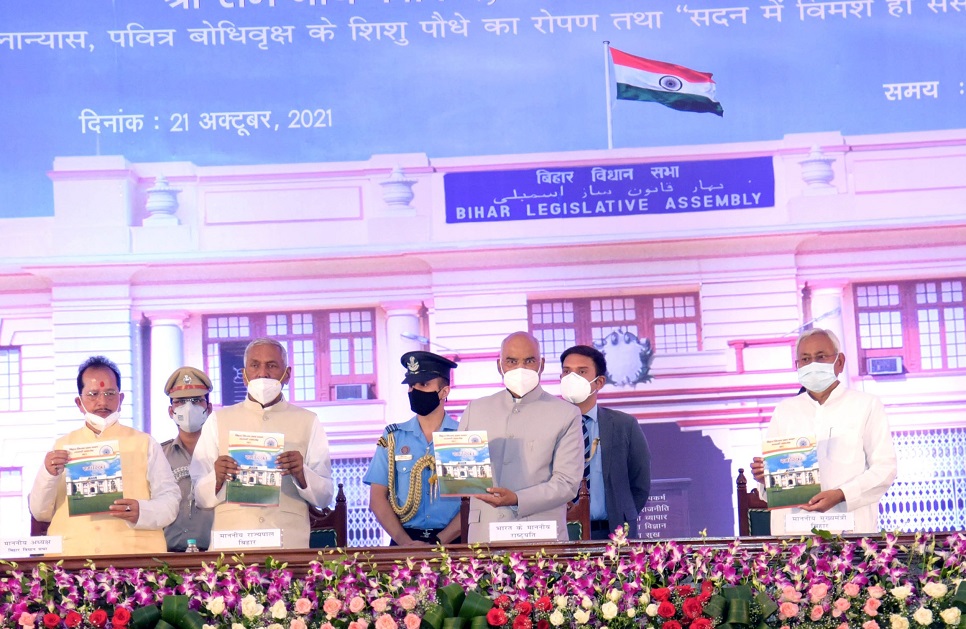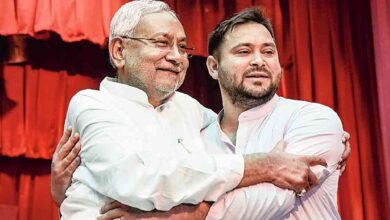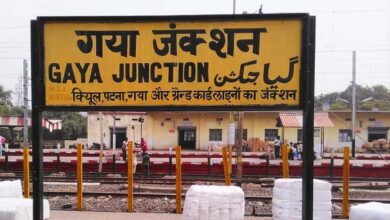President Addresses Centenary Celebration of Bihar Vidhan Sabha

Bihar Vidhan Sabha Bhavan, the sprawling building that accommodates the two houses of state legislature, is now over 100 years old. Addressing the centenary celebrations of Bihar Legislative Assembly on October 21 President Ram Nath Kovind termed the event as a “celebration of democracy”.
Speaking about Bihar’s contribution in democracy, the President said that he is proud that Bihar has been the land of world’s first democracy. Lord Buddha taught wisdom and compassion to the early republics of the world. Also, on the basis of the democratic system of those republics, Lord Buddha set the rules of ‘Sanghas’.
In his last speech in the Constituent Assembly, Babasaheb Dr. Bhimrao Ambedkar made it clear that many of the rules of the Buddhist Sanghas continue to exist even in the present parliamentary system.
Bihar Vidhan Sabha building was formally inaugurated on 7th February 1921 by Lord Satyendra Prasanna Sinha, the first governor of the erstwhile Bihar and Orissa province. The date also coincides with the beginning of the first session of Bihar and Orissa Provincial Legislative Council. After formal inauguration of the building Lord Sinha had addressed the first session of the Council.
Bihar Vidhan Sabha building was formally inaugurated on 7th February 1921 by Lord Satyendra Prasanna Sinha, the first governor of the erstwhile Bihar and Orissa province. The date also coincides with the beginning of the first session of Bihar and Orissa Provincial Legislative Council.
A day-long programme was held on 7 February 2021 to mark the beginning of the centenary celebration. The celebration in February this year was kept short due to the Covid-19 pandemic.
Referring to the contribution made by the people of Bihar in the making of the Constitution of India, the President said: “when the new chapter of our modern democracy was being created by the Constituent Assembly, the personalities of Bihar played an important role.”
Dr. Sachchidananda Sinha, the senior most member of the Constituent Assembly, was nominated as the Interim President and on the 11th December 1946, Dr Rajendra Prasad was elected as the permanent President of the Constituent Assembly. Other personalities from Bihar who made their valuable contributionsin the Constituent Assembly were Shri Anugrah Narayan Sinha, Shri Krishna Sinha, Maharaja Kameshwar Singh of Darbhanga, Shri Jagat Narayan Lal, Shri Shyam Nandan Sahay, Shri Satyanarayan Sinha, Shri Jaipal Singh, Babu Jagjivan Ram, Shri Ram Narayan Singh and Shri Brajeshwar Prasad.
The President said that our democracy, built on the foundation of social and economic justice, freedom, equality and harmony, is flourishing by embracing the democratic values of ancient Bihar in a modern framework. The credit for this goes to the people of Bihar and their elected representatives.
Addressing the members of Bihar Legislature, the President said that the people of Bihar consider themselves to be the architects of their destiny. The President expressed hope that all MLAs would try to give reality to the aspirations of the people with their conduct and working.
Kovind was happy to note that members of Bihar Legislature have started a “Sankalp Abhiyan” to build the state of Bihar free from social problems which is blessed and looked up with respect. He wished that all the MLAs should implement the resolutions taken in this House and make continuous efforts to establish Bihar as a well-educated, well-cultured and well-developed state.
He said that on the strength of such efforts, Bihar would be able to become a leading state on the parameters of ‘Human Development’ by the year 2047 i.e. the centenary year of the India’s independence. In this way, this celebration of the centenary of the State Legislature would prove to be meaningful in the true sense.
Kovind was governor of Bihar before being elected as President of India. He took oath as the 14th President of India on 25th July 2017.
Speaking on the occasion Chief Minister Nitish Kumar said it was a matter of pride for Bihar that one of its former governors was now occupying the Rashtrapati Bhavan.
“Although Dr Zakir Hussain had served as a governor of Bihar before getting elected as the President, he had been the vice president in between. But Kovind’s achievement is rare in that he became the President straight away. Nonetheless, we have fond memories of him and always consider him to be a Bihari,”
Nitish Kumar, Chief Minister, Bihar
“Although Dr Zakir Hussain had served as a governor of Bihar before getting elected as the President, he had been the vice president in between. But Kovind’s achievement is rare in that he became the President straight away. Nonetheless, we have fond memories of him and always consider him to be a Bihari,” the chief minister said.
Speaking about the ban on sale and consumption of liquor in Bihar, President Kovind pointed out that Governor Lord Sinha, in his address to the Legislative Assembly of 1921, had said that there should be a definite policy to prohibit the production and sale of intoxicating substances or liquor. In our Constitution, the duty of the State to improve public health is clearly mentioned under the ‘Directive Principles of State Policy’. This duty also includes the prohibition of the consumption of liquor and substances injurious to health. By giving the status of law to this Constitutional Article based on the principles of Gandhiji, the Bihar Legislative Assembly has taken a very good step in the interest of public health and society, especially in the favour of women from weaker sections, the president said.




